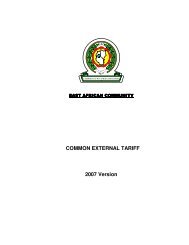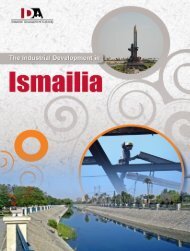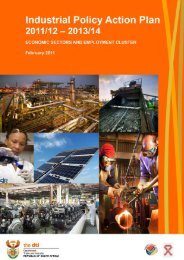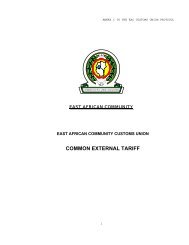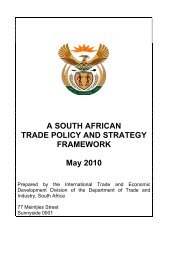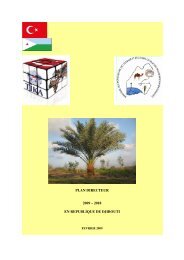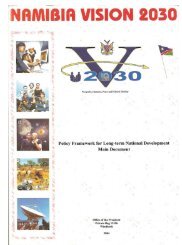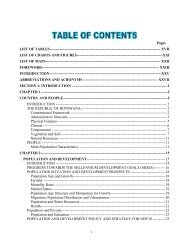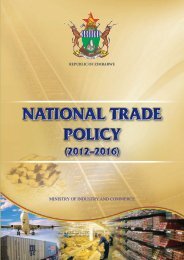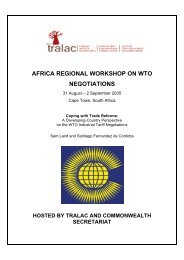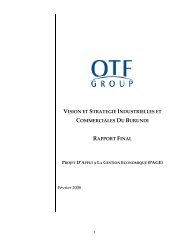rwanda national export strategy - minicom
rwanda national export strategy - minicom
rwanda national export strategy - minicom
Create successful ePaper yourself
Turn your PDF publications into a flip-book with our unique Google optimized e-Paper software.
RWANDA NATIONAL EXPORT STRATEGY<br />
27 th , 2010. 70 This process of vetting feed-backs continued with the RDB management team and associated<br />
organizations. A wider <strong>strategy</strong> validation workshop was then organised in December 2010.<br />
6.2 STAKEHOLDER LIST<br />
The following organizations have so far, had a leading role in NES development:<br />
<br />
<br />
<br />
<br />
<br />
<br />
<br />
<br />
<br />
<br />
<br />
<br />
<br />
Ministry of Agriculture and Animal Resources<br />
Ministry of EAC affairs<br />
Ministry of Finance and Economic Planning<br />
Ministry of Trade and Industry<br />
Private Sector Federation<br />
Private Sector Firms representing NES priority sectors<br />
Rwanda Bureau of Standards<br />
Gender Monitoring Office<br />
RDB/Human Capital & Institutional Development<br />
RDB/Information Technology<br />
RDB/Investment Promotion and Implementation<br />
RDB/Tourism & Conservation<br />
RDB/Trade & Manufacturing (Coordinating Body)<br />
7. IMPLEMENTATION PLAN AND INSTITUTIONAL FRAMEWORK<br />
The detailed implementation plan for the National Export Strategy is attached as Annex 1. This<br />
implementation plan includes activities, budgets, key indicators as well as the lead or implementing<br />
stakeholders. The implementation efforts of the NES should be coordinated with key institutional<br />
stakeholders. Key institutions in these areas include MINICOM, RDB, MINECOFIN, MINAGRI,<br />
MININFRA, OCIR CAFÉ, OCIR THE, RHODA, RALDA, RADA, SPU, RBS, private sector players,<br />
and Development Partners.<br />
High level coordination of the National Export Strategy will be provided by the Industrial Development<br />
and Export Council (IDEC). This Council was proposed in the Industrial Policy and Master Plan as a<br />
High-Level Policy Governance Council. The Chair of the IDEC is MINICOM, to ensure high-level<br />
political oversight. This Council will be responsible for monitoring and evaluation of the implementation<br />
of the NES. In addition, the Council will submit annual reports to the Kivu Retreat on the progress of the<br />
implementation of the NES.<br />
RDB will be the key coordinating institution for the NES, responsible for the implementation of the<br />
<strong>strategy</strong>. It will also act as the secretariat for the NES, calling meetings and ensuring stakeholder<br />
engagement. The NES needs to be managed daily by an agreed upon permanent structure under a special<br />
unit within RDB similar to the ―Doing Business Model‖.<br />
The Public Private Dialogue Framework will be an active platform that provides input into the<br />
implementation process and a consistent dialogue between stakeholders working in key clusters, as well<br />
as those working on the cross-cutting issues affecting the growth of these sectors.<br />
A summary of the activities and actions to be implemented under the cross-cutting issues and the<br />
prioritized sectors is provided in the appendix to the NES document. The detailed sector by sector 5-year<br />
70 This meeting also incorporated representatives from additional sectors such as BNR, OCIR-The, OCIR-Cafe, etc.<br />
Page 42



